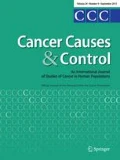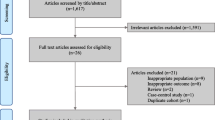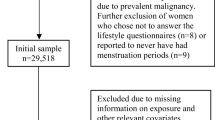Abstract
Epidemiologic studies of hormone therapy (HT) and colorectal cancer incidence consistently show an inverse association; however, few studies have considered prediagnostic use of HT on mortality among colorectal cancer patients. We evaluated the relationship of HT and survival among a population-based cohort of women with large bowel cancer. Cases (n = 1,297) were newly diagnosed with invasive cancer of the colon or rectum, aged 40–74 years at diagnosis, who were identified by Wisconsin’s statewide registry (1988–1991; 1997–2001) for two case–control studies. Information on HT use and other colorectal cancer risk factors was collected by standardized interview. There were 507 deaths (274 of these attributable to colorectal cancer) over 8.4 years of follow-up through December 2005. Hormone use was not associated with colorectal cancer mortality (adjusted hazard rate ratio = 1.09, confidence interval = 0.81–1.47). Colorectal cancer specific mortality was not associated with HT when considered separately by preparation type. Stage did not modify this relationship. Long-term HT was weakly positively associated with increased mortality after diagnosis of proximal colon, but not distal colon cancer. Because we detected no differences in survival among users of HT compared to non-users, the results suggest that HT use may affect only the incidence of some colorectal tumors.
Similar content being viewed by others
References
Potter JD (1999) Colorectal cancer: molecules and populations. J Natl Cancer Inst 91:916–932. doi:10.1093/jnci/91.11.916
Csizmadi I, Collet JP, Benedetti A, Boivin JF, Hanley JA (2004) The effects of transdermal and oral oestrogen replacement therapy on colorectal cancer risk in postmenopausal women. Br J Cancer 90:76–81. doi:10.1038/sj.bjc.6601438
Gambacciani M, Monteleone P, Sacco A, Genazzani AR (2003) Hormone replacement therapy and endometrial, ovarian and colorectal cancer. Best Pract Res Clin Endocrinol Metab 17:139–147. doi:10.1016/S1521-690X(02)00086-6
Grodstein F, Newcomb PA, Stampfer MJ (1999) Postmenopausal hormone therapy and the risk of colorectal cancer: a review and meta-analysis. Am J Med 106:574–582. doi:10.1016/S0002-9343(99)00063-7
Chlebowski R, Wactawski-Wende J, Ritenbaugh C et al (2004) Estrogen plus progestin and colorectal cancer in postmenopausal women. N Engl J Med 350:991–1004. doi:10.1056/NEJMoa032071
Prihartono N, Palmer JR, Louik C, Shapiro S, Rosenberg L (2000) A case-control study of use of postmenopausal female hormone supplements in relation to the risk of large bowel cancer. Cancer Epidemiol Biomarkers Prev 9:443–447
Rossouw JE, Anderson GL, Prentice RL et al (2002) Risks and benefits of estrogen plus progestin in healthy postmenopausal women: principal results From the Women’s Health Initiative randomized controlled trial. JAMA 288:321–333. doi:10.1001/jama.288.3.321
Newcomb PA, Storer BE (1995) Postmenopausal hormone use and risk of large-bowel cancer. J Natl Cancer Inst 87:1067–1071. doi:10.1093/jnci/87.14.1067
Newcomb PA, Zheng Y, Chia VM et al (2007) Estrogen plus progestin use, microsatellite instability, and the risk of colorectal cancer in women. Cancer Res 67:7534–7539. doi:10.1158/0008-5472.CAN-06-4275
Campbell PT, Newcomb P, Gallinger S, Cotterchio M, McLaughlin JR (2007) Exogenous hormones and colorectal cancer risk in Canada: associations stratified by clinically defined familial risk of cancer. Cancer Causes Control 18:723–733. doi:10.1007/s10552-007-9015-7
Hoffmeister M, Raum E, Winter J, Chang-Claude J, Brenner H (2007) Hormone replacement therapy, body mass, and the risk of colorectal cancer among postmenopausal women from Germany. Br J Cancer 97:1486–1492. doi:10.1038/sj.bjc.6604066
Heiss G, Wallace R, Anderson GL et al (2008) Health risks and benefits 3 years after stopping randomized treatment with estrogen and progestin. JAMA 299:1036–1045. doi:10.1001/jama.299.9.1036
Mandelson MT, Miglioretti D, Newcomb PA, Harrison R, Potter JD (2003) Hormone replacement therapy in relation to survival in women diagnosed with colon cancer. Cancer Causes Control 14:979–984. doi:10.1023/B:CACO.0000007970.04094.76
Slattery ML, Anderson K, Samowitz W et al (1999) Hormone replacement therapy and improved survival among postmenopausal women diagnosed with colon cancer. Cancer Causes Control 10:467–473. doi:10.1023/A:1008974215622
Calle EE, Miracle-McMahill HL, Thun MJ, Heath CW Jr (1995) Estrogen replacement therapy and risk of fatal colon cancer in a prospective cohort of postmenopausal women. J Natl Cancer Inst 87:517–523. doi:10.1093/jnci/87.7.517
Ritenbaugh C, Stanford JL, Wu L et al (2008) Conjugated equine estrogens and colorectal cancer incidence and survival: The Women’s Health Initiative Randomized Clinical Trial. Cancer Epidemiol Biomarkers Prev 17:2609–2618. doi:10.1158/1055-9965.EPI-08-0385
Anderson GL, Limacher M, Assaf AR et al (2004) Effects of conjugated equine estrogen in postmenopausal women with hysterectomy: the Women’s Health Initiative randomized controlled trial. JAMA 291:1701–1712. doi:10.1001/jama.291.14.1701
Hersh AL, Stefanick ML, Stafford RS (2004) National use of postmenopausal hormone therapy: annual trends and response to recent evidence. JAMA 291:47–53. doi:10.1001/jama.291.1.47
Nichols HB, Trentham-Dietz A, Hampton JM, Newcomb PA (2005) Oral contraceptive use, reproductive factors, and colorectal cancer risk: findings from Wisconsin. Cancer Epidemiol Biomarkers Prev 14:1212–1218. doi:10.1158/1055-9965.EPI-04-0845
Doria-Rose VP, Newcomb PA, Morimoto LM, Hampton JM, Trentham-Dietz A (2006) Body mass index and the risk of death following the diagnosis of colorectal cancer in postmenopausal women (United States). Cancer Causes Control 17:63–70. doi:10.1007/s10552-005-0360-0
Percy C, Van Holten V, Muir C (1990) International classification of diseases for oncology, 2nd edn. World Health Organization, Geneva
Calle EE, Terrell DD (1993) Utility of the National Death Index for ascertainment of mortality among cancer prevention study II participants. Am J Epidemiol 137:235–241
Breslow NE, Day NE (1987) Statistical methods in cancer research. Volume II-The design and analysis of cohort studies. IARC Scientific Publications, Lyon
Chan JA, Meyerhardt JA, Chan AT et al (2006) Hormone replacement therapy and survival after colorectal cancer diagnosis. J Clin Oncol 24:5680–5686. doi:10.1200/JCO.2006.08.0580
Persson I, Yuen J, Bergkvist L, Schairer C (1996) Cancer incidence and mortality in women receiving estrogen and estrogen-progestin replacement therapy—long-term follow-up of a Swedish cohort. Int J Cancer 67:327–332. doi:10.1002/(SICI)1097-0215(19960729)67:3<327::AID-IJC4>3.0.CO;2-T
Sturgeon SR, Schairer C, Brinton LA, Pearson T, Hoover RN (1995) Evidence of a healthy estrogen user survivor effect. Epidemiology 6:227–231
Zielinski SL (2005) Hormone replacement therapy for breast cancer survivors: an answered question? J Natl Cancer Inst 97:955
Campbell-Thompson M, Lynch IJ, Bhardwaj B (2001) Expression of estrogen receptor (ER) subtypes and ERbeta isoforms in colon cancer. Cancer Res 61:632–640
Acknowledgments
Financial support: This work was supported in part by the Alcoholic Beverage Medical Research Foundation and National Institute of Health grant CA47147.
Author information
Authors and Affiliations
Corresponding author
Rights and permissions
About this article
Cite this article
Newcomb, P.A., Chia, V.M., Hampton, J.M. et al. Hormone therapy in relation to survival from large bowel cancer. Cancer Causes Control 20, 409–416 (2009). https://doi.org/10.1007/s10552-008-9255-1
Received:
Accepted:
Published:
Issue Date:
DOI: https://doi.org/10.1007/s10552-008-9255-1




